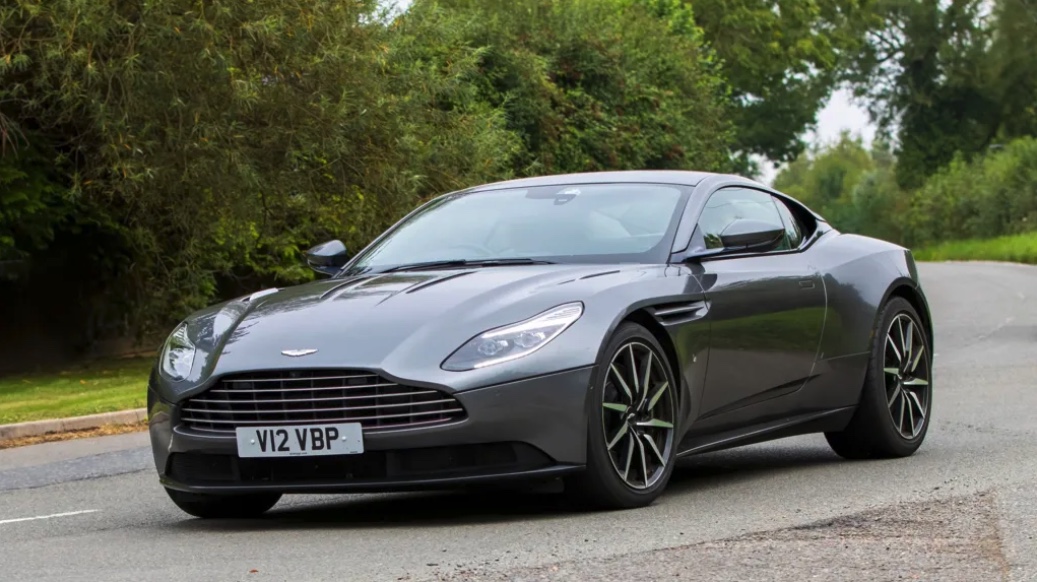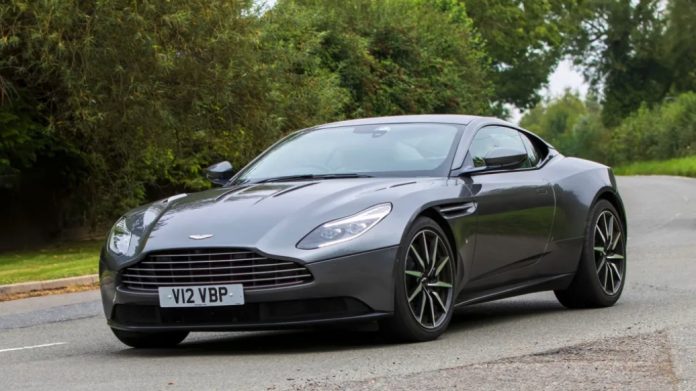ราคาหุ้นของ Aston Martin ผู้ผลิตรถยนต์หรูหราลดลงกว่า 20% หลังจากบริษัทประกาศว่ากำไรจะต่ำกว่าที่คาดไว้ในปีนี้ บริษัทที่เป็นที่รู้จักจากความสัมพันธ์กับสายลับในนิยายอย่างเจมส์ บอนด์ เผชิญกับปัญหาด้านห่วงโซ่อุปทานและยอดขายที่ลดลงในจีน
ราคาหุ้นของ Stellantis เจ้าของแบรนด์ Peugeot, Citroen, Fiat และ Jeep ก็ลดลงอย่างมากเมื่อวันจันทร์หลังจากมีคำเตือนเกี่ยวกับกำไร
ผู้ผลิตรถยนต์ทั่วยุโรปกำลังประสบปัญหา เนื่องจากยอดขายที่น่าผิดหวังและการแข่งขันที่เพิ่มขึ้นจากต่างประเทศส่งผลกระทบอย่างมากต่อรายได้
Aston Martin เป็นแบรนด์ชั้นนำที่ผลิตรถยนต์หรูในปริมาณน้อย ปีที่แล้ว บริษัทขายรถยนต์ได้ 6,620 คัน โดยประมาณหนึ่งในห้าของยอดขายเหล่านั้นไปยังภูมิภาคเอเชียแปซิฟิก อย่างไรก็ตาม บริษัทระบุว่ากำลังประสบกับความต้องการที่ลดลงในจีน ซึ่งเศรษฐกิจที่ชะลอตัวส่งผลกระทบต่อยอดขายรถยนต์หรู
นอกจากนี้ บริษัทยังประสบปัญหาจากผู้ผลิตบางรายที่ทำให้ไม่สามารถสร้างโมเดลใหม่ได้ตามแผน ด้วยเหตุนี้ Aston จึงระบุว่าจะผลิตรถยนต์ได้ประมาณ 1,000 คันน้อยกว่าที่วางแผนไว้ในปีนี้ ยอดขายซึ่งเคยคาดว่าจะเพิ่มขึ้น ตอนนี้คาดว่าจะลดลงจากปี 2023 และรายได้จะต่ำกว่าที่ตลาดคาดการณ์
Adrian Hallmark ซึ่งเพิ่งเข้ารับตำแหน่งซีอีโอของ Aston Martin เมื่อไม่กี่สัปดาห์ก่อน กล่าวว่า “มีความชัดเจนว่าต้องดำเนินการอย่างเด็ดขาด” เพื่อปรับการผลิตให้เหมาะสม แต่เขาเสริมว่าเขา “เชื่อมั่นมากกว่าที่เคย” ถึงศักยภาพในการเติบโตของแบรนด์
บริษัทยักษ์ใหญ่ในอุตสาหกรรมกำลังประสบปัญหา ขณะเดียวกัน Stellantis กลายเป็นผู้ผลิตรถยนต์รายใหญ่ล่าสุดที่ปรับปรุงการคาดการณ์ทางการเงินใหม่ เนื่องจากการชะลอตัวของแนวโน้มอุตสาหกรรม บริษัทกำลังประสบปัญหาความต้องการที่อ่อนแอในสหรัฐฯ ซึ่งเป็นตลาดหลัก โดยบริษัทถูกบังคับให้เสนอส่วนลดเพื่อกำจัดสต็อกรถที่ไม่ได้ขาย
บริษัทต้องเผชิญกับการแข่งขันที่เพิ่มขึ้นจากแบรนด์จีนที่กำลังขยายตัวอย่างรวดเร็วในต่างประเทศ ด้วยเหตุนี้ บริษัทจึงคาดว่ากำไรสุทธิจะต่ำกว่าที่คาดการณ์ไว้ในปีนี้ การประกาศดังกล่าวทำให้ราคาหุ้นของบริษัทลดลง โดยในช่วงเที่ยงวันจันทร์ ราคาหุ้นลดลงกว่า 14%
ปัญหาของ Stellantis และ Aston Martin สะท้อนถึงสภาวะที่ย่ำแย่ในอุตสาหกรรมยานยนต์ยุโรป เมื่อวันศุกร์ที่ผ่านมา Volkswagen ได้ออกคำเตือนเรื่องกำไรครั้งที่สองในรอบสามเดือน และยังมีการกล่าวถึงความเป็นไปได้ที่จะต้องปิดโรงงานในเยอรมนีเป็นครั้งแรกในประวัติศาสตร์
คู่แข่งในเยอรมนีอย่าง Mercedes-Benz และ BMW ก็ปรับลดการคาดการณ์กำไรในช่วงไม่กี่สัปดาห์ที่ผ่านมา ปัญหาที่พบบ่อยคือยอดขายที่ลดลงในจีน ซึ่งจนถึงไม่นานมานี้เคยเป็นตลาดที่ทำกำไรสูงสำหรับโมเดลรถยนต์หรูหรา นอกจากนี้ยังมีการแข่งขันที่เพิ่มขึ้นจากแบรนด์จีนในตลาดอื่น ๆ
Matthias Schmidt จาก Schmidt Automotive Research กล่าวว่า บริษัทในยุโรปต้องเผชิญกับการลดราคา “ที่ไม่ยั่งยืน” จากแบรนด์จีนในตลาดบ้านเกิดของตน ซึ่งส่งผลต่อยอดขายรถยนต์ราคาสูง “แบรนด์เยอรมัน โดยเฉพาะ VW ถูกจับไม่ทันต่อการเปลี่ยนแปลงที่รวดเร็วในจีน” เขาอธิบาย
ยอดขายรถยนต์ไฟฟ้าชะลอตัว ยอดขายรถยนต์ไฟฟ้าที่ผู้ผลิตได้ลงทุนเงินจำนวนมหาศาลในการพัฒนา กลับชะลอตัวอย่างมากในยุโรป ตามข้อมูลจากสมาคมผู้ผลิตยานยนต์แห่งยุโรป ยอดขายรถยนต์พลังงานแบตเตอรี่ลดลงเกือบ 44% ในเดือนสิงหาคมเมื่อเทียบกับช่วงเดียวกันของปีที่แล้ว ขณะที่ส่วนแบ่งการตลาดลดลงเหลือ 14.4% เทียบกับ 21% ในปี 2023
การลดลงดังกล่าวเกิดขึ้นหลังจากการยกเลิกหรือการลดแรงจูงใจสำหรับผู้ซื้อรถยนต์ไฟฟ้าในหลายตลาดยุโรป เช่น ฝรั่งเศสและเยอรมนี
ในวันศุกร์นี้ ประเทศในสหภาพยุโรปมีกำหนดจะลงคะแนนเสียงในแผนการที่จะกำหนดภาษีศุลกากรที่สูงขึ้นต่อการนำเข้ารถยนต์ไฟฟ้าจากจีน มาตรการเหล่านี้ถูกออกแบบมาเพื่อปกป้องผู้ผลิตในท้องถิ่นจากการแข่งขันที่ไม่เป็นธรรม คณะกรรมาธิการยุโรปอ้างว่า ผู้ผลิตจีนได้รับประโยชน์จากเงินอุดหนุนที่ผิดกฎหมายจากรัฐบาลจีน และเชื่อว่าภาษีศุลกากรจะสร้างการแข่งขันที่ยุติธรรม
อย่างไรก็ตาม แผนดังกล่าวมีความขัดแย้งและได้รับการตอบรับที่หลากหลายจากผู้ผลิต
Aston Martin shares shaken after profit warning

Luxury carmaker Aston Martin’s share price sank more than 20% after it said profits will be lower than expected this year.
The company, famed for its links to fictional superspy James Bond, has been hit by supply chain issues and falling sales in China.
The share price of Stellantis, the owner of brands such as Peugeot, Citroen, Fiat and Jeep, also plummeted on Monday after a profit warning.
Carmakers across Europe have been suffering lately, with disappointing sales and increased competition from abroad taking a heavy toll on earnings.
Aston Martin is a prestige brand which makes upmarket cars in relatively small quantities.
Last year, it sold 6,620 vehicles, with about a fifth of those going to the Asia-Pacific region.
However, the company says it has been hit by a fall in demand in China, where a slowing economy has affected sales of luxury cars.
It has also been affected by problems at a number of suppliers, which have affected its ability to build a number of new models.
As a result, Aston says it will make about 1,000 fewer cars than originally planned this year.
Sales, which had originally been forecast to rise, are now expected to be lower than in 2023, and earnings will fall short of current market expectations.
Adrian Hallmark, who became Aston Martin’s chief executive a few weeks ago, said it had become clear that “decisive action” was needed to adjust output.
But he added that he was “even more convinced than before” about the brand’s potential for growth.
Industry giants suffering
Meanwhile, Stellantis has become the latest large-scale carmaker to revise its financial forecasts, thanks to a deterioration in the industry outlook.
The company has been struggling with weak demand in the US, a key market, where it has been forced to offer discounts in order to shift unsold stock.
It has also been facing increased competition from Chinese brands, which have been expanding aggressively abroad.
As a result, it said it expects its profit margins to be significantly lower than previously thought this year.
The announcement sent its shares tumbling. By lunchtime on Monday, the price was down more than 14%.
The problems at Stellantis and Aston Martin reflect a wider malaise in the European car industry.
On Friday, Volkswagen issued its second profit warning in three months, while it has also suggested it might have to close plants in Germany for the first time in its history.
Its German rivals Mercedes-Benz and BMW have also downgraded their profit forecasts in recent weeks.
Among the common issues are falling sales in China – until recently a highly lucrative market for expensive and profitable high-end models – coupled with growing competition from Chinese brands in other markets.
According to Matthias Schmidt of Schmidt Automotive Research, European firms have been caught out by a wave of “unsustainable” discounting by Chinese brands in their home market, which has affected sales of high-priced vehicles.
“German brands, and VW in particular, have been caught off-guard by the pace of change in China” he explains.
EV sales falter
Sales of electric cars, which manufacturers have invested huge sums in developing, have been faltering badly in Europe.
According to data from the European Automobile Manufacturers Association, sales of battery-powered cars were down nearly 44% in August compared to the same period a year ago, while their share of the market dropped to 14.4%, compared to 21% in 2023.
The decline has followed the removal or reduction of incentives for electric car buyers in a number of European markets, including France and Germany.
On Friday, EU nations are due to vote on plans to impose steep tariffs on imports of electric vehicles from China.
The measures are designed to protect local producers from unfair competition. The European Commission claims Chinese manufacturers benefit from illegal subsidies from the Chinese government – and believes tariffs will create a level playing field.
But the plan is controversial, and has received a mixed reception from manufacturers.
By Theo Leggett, BBC News

















